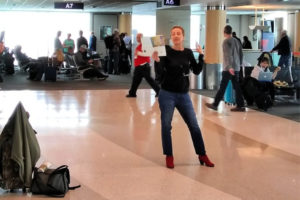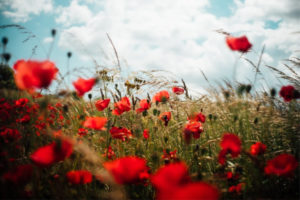Anya Krugovoy Silver, 49, died on August 6, 2018 from metastatic inflammatory breast cancer. She was the author of four books of poetry: The Ninety-Third Name of God, I Watched You Disappear, From Nothing, and Second Bloom. Her work was featured in numerous journals and anthologies, including Best American Poetry 2016. She was awarded a Guggenheim Fellowship in 2018. Bearings Online contributor, Josina Guess, met Silver a few months before her death and offers this appreciation.

Anya Silver reading at the pop-up poetry reading in the Grand Rapids, MI airport in April, 2018.
“Is there a poet in the house?”
It’s not a surprise for a doctor to be called upon in a crowded place to render their services, but it’s rare for poets to be asked to save the day.
The question bubbled up among a group of fellow travelers as we watched mid-April snow cover the tarmac. Every flight out of Grand Rapids, Michigan, was grounded for several hours and we were stranded. Many of us were in the airport after attending the 2018 Festival of Faith and Writing, an event that inspired and emboldened us to harness the power of words. Someone, I forget now who, said that we should have an impromptu poetry reading. I latched onto the idea and started asking people that I had just met if they would want do a pop-up poetry reading, a creative way to make the most of this disappointing turn of events for a bunch of homesick, airport-stuck people. Word spread and a small crowd began to gather near Gate A6.
We weren’t saving anyone’s life, but life felt more beautiful.
“Yes,” came the response from the red lips of a smartly dressed, short-haired, Georgia-bound woman. Anya Silver said her “yes” with confidence, but gave no indication that she was a 2018 Guggenheim Fellow, author of four books of poetry, 2015 Georgia Author of the Year for Poetry, a beloved professor of English at Mercer College, and a featured speaker at the festival. She graciously shared the airport floor and equal time with anyone who answered “yes,” even if we all weren’t quite sure if we could call ourselves poets. A passerby pulled out his earbuds and stood still to listen. We weren’t saving anyone’s life, but life felt more beautiful, and the hours in the airport more tolerable after a healthy dose of spoken words.
After the pop-up poetry reading, Anya sat beside me and offered encouragement and tips for publication. She exuded a contagious love of life and desire to help others to shine. Somewhere in the conversation she mentioned that she had been living with terminal cancer for the past fourteen years. That would explain the short hair, and, perhaps, the cool courage that she exuded. I wanted to learn more from her, I wanted in on her secret for resilience and joy. We exchanged information and I thought to myself: we live in the same state, she is a Christian and poet, surely, we will meet again.
All of us are dying, but healthy people tend to forget that.
In late July, I wrote a little blurb on Facebook about how I was disappointed in myself. I had slept in instead of waking up early to write and, in response, my young daughter chided me for devaluing the importance of sleep. Anya commented on the post that she woke up at 10 AM that day and then took a nap. Having lost other friends and family members to cancer, I worried that this excessive sleepiness could be a sign that she was declining quickly. I did what many of us do and kept silent, unsure of how to respond. I clicked “like,” at her sense of humor. Ten days later she was dead. (I could replace “she was dead” with a nice cliched metaphor like she crossed over, passed away, lost the battle, entered into eternal rest. But based on Anya Silver’s prolific writing on pain, death, cancer, and grief, I think it appropriate to just write it plainly. She died suddenly and quite unexpectedly to those closest to her.) In a June interview she said, “All of us are dying, but healthy people tend to forget that.” Now I look back at her little note to me as a reminder that rest matters, even for those of us who don’t think that we are dying and not to take myself, or my work, too seriously.
Much of Anya Silver’s poetry revealed her experience of living for over a decade with a disease that she knew would kill her, but she also wrote poems that were full of sacred observations of the mundane things that make this fleshy life so holy. Her poems about an old house in need of repair, laundry, a gift of fancy salt, are distilled observations of the flavor, textures, colors, and relationships that reveal a life fully lived. Maybe proximity to death made every day and blessed moment shimmer with clarity. She had the gift of writing poems that were simultaneously accessible and rich with depth and mystery. In her poem “Stage IV” (Image Journal, 2016) she likens her shared experience with other people with terminal cancer to that of exiles on a boat “and we know what our beloveds do not / yet know. We can see through each other / to the lapping silence beyond the Milky Way.”
Through the legacy of her words, she continues to offer sustenance for the living.
In the month since Anya’s passing I’ve deepened a posthumous friendship with her through her work and through the people who know her well and were loved by her. Her husband, fellow Mercer Professor Andrew Silver, uses her social media accounts to post her published and unpublished poems and writings. These snippets open windows into his grief and how Anya may have commented on everything from her own memorial service to rape culture, immigration, poverty, and unjust laws. Her healing words are needed and they continue to give life. At her eventual death, she encouraged people to rage, to wail and openly grieve, to “mimic the outraged / cries of crows.” And so, through the legacy of her words, she continues to offer sustenance for the living. “The mother died and she grew into a tree…each nut a word that she’d grown to tell her son / now that her speaking human voice was / gone.”
I met Anya Silver only once, as a fellow stranded traveler, trying to build community and create beauty in the moment we were given. But I really thought I would see her again. It felt strange to grieve a newly gone friend through a computer screen, so I took a Sunday afternoon in September to drive alone down long country roads to her memorial service in Macon, Georgia. A red poppy on the bulletin cover and a line from one of her poems, “To bloom is so foolish that it must be wisdom,” revealed the heart of an artist who bloomed with glorious brilliance and encouraged others to do the same. People shared how she taught them how to live and thrive beyond their own traumas and grief. At the service a friend of hers read an open letter by Anya to her teenage son, Noah, and ultimately to all of the people feeling hollowed out with rage and confusion at her death. In it, Anya expressed her trust, grounded in her Christian faith and deep love for all of humanity, that death is not the end of the soul. “I will see you again,” she promised.
 People who knew her well were not surprised that I made the trip to her memorial service, even though I’d met her only once. In fact, I saw another woman from our airport gathering who had met Anya just a few days before I had. At the service, I heard some of Anya’s favorite songs, art, and poems, listened to her son’s high school brass band play outside of the chapel, and learned how she emboldened people to live fully into each blessed moment. Afterward, I greeted Anya’s husband, Andy, and let him know how thankful I was to have met her this year. “I just thought I would see her again,” I told him, “and this seemed like my chance.” Having gathered briefly with those who loved her, I had to agree with Andy when he replied, “I think you did.”
People who knew her well were not surprised that I made the trip to her memorial service, even though I’d met her only once. In fact, I saw another woman from our airport gathering who had met Anya just a few days before I had. At the service, I heard some of Anya’s favorite songs, art, and poems, listened to her son’s high school brass band play outside of the chapel, and learned how she emboldened people to live fully into each blessed moment. Afterward, I greeted Anya’s husband, Andy, and let him know how thankful I was to have met her this year. “I just thought I would see her again,” I told him, “and this seemed like my chance.” Having gathered briefly with those who loved her, I had to agree with Andy when he replied, “I think you did.”
Like this post? Subscribe to have new posts sent to you by email the same day they are posted.



Thank you for these beautiful, honest and inspiring words, Josina. Looking forward to seeing you again at some intersection in our lives/writings.
Ann Laird Jones
Greenville, Mississippi
Thank you, Ann!